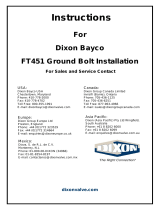Page is loading ...

Adjustment & Calibration
Instructions
For
Dixon Bayco
2180 AND 3180 ADJUSTABLE AIR
RELIEF VALVES
Canada:
Dixon Group Canada Limited
Innisfil (Barrie), Ontario
Phone: 705-436-1125
Fax: 705-436-6251
Toll Free: 877-963-4966
E-mail: isales@dixongroupcanada.com
USA:
Dixon Bayco USA
Chestertown, Maryland
Phone: 410-778-2000
Fax: 410-778-4702
Toll Free: 800-355-1991
E-mail: dixonbayco@dixonvalve.com
Mexico:
Dixva, S. de R.L. de C.V.
Monterrey, N.L
Phone: 01-800-00-DIXON (34966)
Fax: 01-81-8354-8197
E-mail: contactenos@dixonvalve.com.mx
Europe:
Dixon Group Europe Ltd
Preston, England
Phone: +44 (0)1772 323529
Fax: +44 (0)1772 314664
E-mail: enquiries@dixoneurope.co.uk
Asia Pacific:
Dixon (Asia Pacific) Pty Ltd Wingfield,
South Australia
Phone: +61 8 8202 6000
Fax: +61 8 8202 6099
E-mail: enquiries@dixonvalve.com.au
dixonvalve.com
For Sales and Service Contact

2180 and 3180 Adjustable Air Relief Valves
2 090076 R5 2180 and 3180 ARV
Air Relief Valve – Theory of Operation
All Dixon Bayco air relief valves are spring-loaded system-pressure
actuated devices consisting of a valve disc held in a closed position
against a valve seat by means of spring pressure. The pressure in
the system to be protected always acts on the valve disc and would
tend to open the valve, however the spring load is set so as to ensure
that the pressure in the system, at normal operating pressures, is
insufficient to open the valve. However, when the system pressure
builds to a level when the pressure load on the valve disc is equal to
the load exerted by the spring, the valve will begin to open. If the
pressure in the system were to be held at this level, the load acting to
open the valve and the spring load acting to keep the valve closed
would remain in equilibrium and the valve would be neither open nor
closed. In such circumstances the valve will tend to flutter on the
valve seat and may release a small amount of air but will not be
relieving significant pressure from the system. This point is known as
the warning pressure or cracking pressure.
If the pressure in the system continues to rise, the load acting on the
face of the valve, and tending to open the valve will also continue to
rise and will begin to exceed the load exerted by the spring, which
tends to keep the valve closed. When the opening load, due to
system pressure, exceeds the closing load, due to spring force, the
valve will open, and, as long as the system pressure remains
sufficient, will stay open. This point is known as the opening pressure
or set pressure (also referred to as rated or popping pressure). The
difference between the crack pressure and opening pressure varies
between valves and is also related to the system flow rate. However,
the two should not be confused, as there is a significant difference in
pressure between the two points.
If the system pressure continues to rise, the valve will continue to
open and will relieve more and more air until the valve is fully open.
At this point the valve will be relieving close to its maximum airflow
rate, further increase in system pressure will show only relatively
minor increases in flow rate. If the system pressure decreases the
relieving airflow rate will reduce and the valve will start to close but
will not fully reseat until some pressure below the opening pressure,
this pressure is known as the reseating pressure and the difference
between the two pressures is known as “blowdown”.

2180 and 3180 Adjustable Air Relief Valves
2180 and 3180 ARV 090076 R5 3
In practice the valve should be matched to the system to be protected
such that the maximum airflow rate of the valve is never utilized, i.e.
the valve should be capable of relieving a sufficient volume flow rate
of air at the opening pressure to ensure that the system pressure
drops significantly. If the valve is open and the system pressure
continues to rise above the opening pressure then the valve is
relieving less air than is being put into the system. This is a potentially
dangerous situation that may lead to over pressurization. Air relief
valves should always be matched to the system to be protected such
that the relieving airflow rate of the valve at the maximum allowable
system pressure, and ideally at the opening pressure, is well in
excess of the system input flow rate at that same pressure.

2180 and 3180 Adjustable Air Relief Valves
4 090076 R5 2180 and 3180 ARV
Valve Adjustment
Dixon Bayco adjustable air relief valves should be adjusted
no more than +/- 3 PSI from the factory supplied setting.
Adjustment in excess of +/- 3 PSI may result in a failure to vent
or a significant loss of venting capacity.
1. Remove both top screws and small cap from the valve top cover.
2. To increase pressure setting - rotate threaded rod clockwise and
tighten nut down to base.
To decrease pressure setting – rotate threaded rod counter clockwise
and tighten nut down to base.
3. Place top cap onto the valve top cover and re-fasten both screws.
4. To Seal Valve for Tamper Proofing:
After settings have been selected, place the cup seal cap over the
cup seal base (attached to one of the top screws) and press down
firmly to lock. This cup seal is intended to ensure the valve will not be
tampered with after the final pressure setting has been selected.
Testing
The opening pressure of this valve may indicate differently depending
on the test equipment, instrumentation and air supply used. Where
possible the valve should be tested using identical conditions and the
same equipment as will be found on the system to be protected.
When this is not practical the test set-up should, as closely as
possible, approximate the conditions of the system to be protected.
Additionally the calibration of your test system should be checked
against your actual system by comparing the opening pressure of the
same relief valve on both systems.
1. Ensure that your air supply is rated to at least 100 PSI and that at
least 250 SCFM of airflow is available. If the air supply flow rate is
much less than the rated flow rate of the relief valve, the relief valve
will appear to relieve at a lower pressure than the rated value. This
discrepancy arises because the relief valve is a spring device that is
designed to lift slightly before the set relief (opening) pressure, but
will not flow a significant volume of air until the air reaches the
opening pressure. If the SCFM flow rate is low the air relief valve will
relieve a volume of air at lift pressure that cannot be made up by the
supply source, therefore the tester will not be able to reach the
opening pressure setting. In this situation the maximum pressure
read on the tester pressure gauge will be the initial lift pressure and
not the rated opening pressure.

2180 and 3180 Adjustable Air Relief Valves
2180 and 3180 ARV 090076 R5 5
All test equipment should be rated suitable for use with
high-pressure air.
2. Ensure that all supply lines and connections are at least ¾".
3. Ensure that all relevant instrumentation is correctly calibrated.
4. The most accurate results will be obtained when the relief valve to
be tested is connected to an accumulator or air receiver tank such
that the dynamic effect of the compressor system is reduced. Failure
to do so may result in an indicated opening pressure lower than the
actual.
5. Screw the pressure relief valve to be tested into a 2" (for 2180), or
3" (for 3180), port on your test system using pipe sealant on the air
relief valve threads.
6. Open supply pressure isolation valve and allow air receiver tank
pressure to rise.
Tank pressure should be allowed to rise at a rate of approximately
2psi / second. Flow rates greater than this will cause the relief valve
to flutter rapidly. In this condition the valve plate inertia may cause
the apparent opening pressure to be lower than the calibrated value
and will make accurate testing impossible.
The relief valve will start to discharge at a pressure slightly below the
rated value, at this pressure some hissing may be evident but the
pressure in the tank should continue to rise (assuming air source
provides a sufficient flow rate). The valve opening pressure (RATED
VALUE) can be read on the tester pressure gauge when the valve
plate (11) reaches an equilibrium (open) position.
If the air supply provides a flow rate in excess of the
maximum flow rate capacity of the relief valve at the relieving
pressure, the valve will not be able to relieve a sufficient volume
of air to prevent tank pressure from continuing to rise. In this
condition serious personal injury and extensive property
damage may occur due to over pressurization of test
components.

2180 and 3180 Adjustable Air Relief Valves
6 090076 R5 2180 and 3180 ARV
Valve Installation
1. Prior to installation, clean any dirt or foreign matter from threading
surfaces.’
2. Install air relief valve in positions ranging from vertical (0°) to
horizontal (90°). Do not install valve in inverted position.
3. Install air relief valve with exhaust area positioned so exhaust
vents safely (preferably down as shown in attached diagram). In
horizontal applications, ensure that the small vent hole in the side of
the top cover is facing downward. Downward venting helps prevent
dirt or debris from entering the valve.
4. Apply pipe sealant to threading surfaces prior to installation.
5. Thread the valve into place by hand and tighten using a crescent
wrench (or equivalent) across the hex flats.
Care and Handling
Brand New Dixon Bayco air relief valves are tested at the factory and
are in proper working condition when shipped. Air relief valves are
designed to be tough and to provide long service with reasonable
care and handling.

2180 and 3180 Adjustable Air Relief Valves
2180 and 3180 ARV 090076 R5 7
Operation and Maintenance Instructions
Weekly visual inspection of the valve is recommended.
1. Ensure that the valve body and exhaust vents are kept clear of
buildup.
2. Ensure that exhaust vents remain clear of all obstructions.
3. Inspect the valve regularly to ensure thread tightness. Excessive
vibration may cause valve to loosen over time.
4. Inspect the valve regularly to ensure thread tightness. Excessive
vibration may cause valve to loosen over time.
5. Should any problems arise with the valve, remove from service
immediately and contact your Dixon Bayco distributor.
Dixon Bayco Warranty
For complete warranty information, please refer to the latest
Dixon catalog.
/











